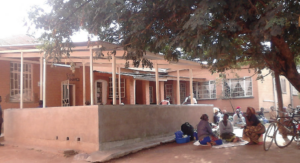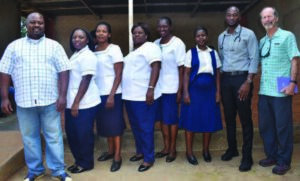A generous gift from Hyman and Marietta Bielsky will fund a new clinic in Malawi for reproductive health and sexually transmitted infections. The new clinic will replace a 50-year-old infrastructure for sexually transmitted disease research and care, the place where UNC’s global health work began.

Long-lived friendships are special connections with those who knew you back when. But even more special is the rare friendship that extends beyond college and adulthood, and even rarer, leaves a trail of good that can impact generations to come.
When Professor Irving Hoffman, PA, MPH, Director of International Operations for the Institute for Global Health & Infectious Diseases (IGHID), and International Director of UNC Project Malawi, called up his long-time friend Hyman Bielsky (‘76) in Sunny Isles, Florida, he wanted to talk about fundraising for a new reproductive health clinic in Malawi. He hoped he might tap into Hyman’s business expertise to get ideas about fundraising. He never imagined Hyman and his wife Marietta (’77) would donate all of the funding needed—full stop.
“We were sitting in our living room, looking at the clinic proposal Irving sent us, and we immediately understood the good the clinic would deliver,” said Hyman. “In this world, there are not many things that are black and white like that.”
Where UNC’s Global Health Began

Built in the 1970s, the current clinic within Bwaila District Hospital sits at the heart of a busy town center in Lilongwe, in the capital city of Malawi situated in southern Africa. The building was originally the site of the Lilongwe district’s tuberculosis registry, and was later renovated by UNC in 1997 to become the country’s first HIV treatment center. Today, it’s the go-to clinic for many people seeking public health services. It’s also the only specialized sexually transmitted infection (STI) clinic in the capital, serving 15,000 clients a year, of whom 60% are women and 25% are living with HIV. These clients seek same day diagnostic, treatment and preventive services for sexually transmitted infections, STI risk reduction and couples counseling, as well as the provision of condoms and HIV pre-exposure prophylaxis—all in a crumbling building without ventilation, that leaks during the rainy season.
“Malawi is where everything started. All global health at UNC began in this clinic, looking at the relationship between HIV and the traditional sexually transmitted diseases,” explained Hoffman, who co-founded Project Malawi with Dr. Myron Cohen in 1990. “It’s been a valuable platform for our research in reproductive health, HIV, and many other sexually transmitted diseases from the very beginning.”

Currently, the clinic is the base for research in the development of HIV management, a syphilis and gonorrhea vaccine, the monitoring of antibiotic resistance to gonorrhea (sponsored by the World Health Organization), the investigation of non-genital sites of gonorrhea among women, and interventions to address excessive alcohol use that effects adherence to prevention programs. Researchers are also working to determine the best approach for providing pre-exposure prophylaxis for HIV to the most at-risk populations, as well as the etiologies of genital ulcers, to refine the syndromic treatment approach.
But in recent years, an aging infrastructure has made provision of care and the conduct of research more challenging. UNC Malawi Country Director, Innocent Mofolo, says the new facility will provide a safe environment for patients, especially needed with COVID and other emerging diseases, as well as staff, who are often overwhelmed by the number of patients and limited space.
“Receiving care in a good environment is therapeutic in itself,” Mofolo said. “This will be a state-of-the-art site for research, education, care, and treatment, and most of all healing.”
A Passion for Women’s Health, Emphasizing Reproductive Health
The facility will also offer new opportunities to deliver reproductive health care and STI/HIV research, while also building local capacity for training residents and fellows from Malawi and the U.S., who are studying family medicine, urology, gynecology, pharmacology and epidemiology.

Women, who are more vulnerable to HIV infection and sexually transmitted diseases due to complex social and cultural norms of Malawian society, will particularly benefit from services. HIV prevalence in adolescent girls and young women between 15 and 24 years old is three times higher compared to males in the same age group.
Marietta Bielsky is passionate about women’s health. “Women in Africa can be powerful instruments for change in their families and communities when they can make choices about their health with access to health services.”
Marietta also recognizes Irving’s good heart and knows his passion for good.
Their Friendship Will Impact Generations to Come
They all met in Chapel Hill the summer of 1976, friendships that started with pick-up basketball at Woollen Gym soon saw marriage and family, and through the years, successful careers. Hyman graduated from UNC School of Law, practicing law before changing to business. Irving graduated from Duke’s Physician Assistant Program and UNC’s School of Public Health joining the UNC faculty in 1992. Hyman and Marietta saw Irving engaged in pioneering work in HIV and sexually transmitted diseases, and this research would propel UNC into the global health spotlight.
“We’re really proud of the work he’s done, and we know this project is going to be done right because he’s involved,” said Marietta. “This was an opportunity too good to turn down.”
Designed For Research Excellence
Groundbreaking for the one-level building (11,712 sq ft) is expected to begin mid-year. Dr. Mitch Matoga, UNC Director of STI Research and Clinical Services, says new design efficiencies will improve the overall patient experience.
“We’re looking forward to having adequate space and personnel to provide high quality care. Our research participants will be comfortable and waiting times will be improved tremendously. With the new space, we will be able to implement several research protocols at the same time without worrying about space or privacy of our participants.”
Hyman and Marietta are philanthropists who admit, they weren’t looking to fund a clinic in Malawi, but they’re glad the opportunity introduced itself.
“We feel fortunate we were offered the chance because we genuinely believe this is a compelling project for good,” Hyman said. “We’re honored to be associated with it.”
About UNC Project Malawi
UNC Project Malawi began as a collaboration with the Malawi Ministry of Health with the design of clinical management guidelines for HIV and STDs, founded by Myron Cohen and Irving Hoffman in 1990. This partnership was institutionalized in 1999 when UNC Malawi activities were consolidated into a center of excellence for HIV/STD research, patient care and capacity building, on the campus of Kamuzu Central Hospital, a 1,000-bed, public tertiary care hospital operated by the Ministry of Health. Today, operating through the Institute for Global Health & Infectious Diseases, UNC Project Malawi has 320 employees who conduct independent research and care for patients, with clinical registries in pediatrics, cancer, trauma, STI and sickle cell. Both Malawi and U.S. trainees benefit from years of capacity building and sustained research and scholarship.
About the Institute for Global Health & Infectious Diseases
Established in 2007, the Institute for Global Health & Infectious Diseases (IGHID) is the engine that drives UNC’s global health research, bringing transformative solutions to the most important global health issues of our time–through research, training and service. IGHID’s work has saved millions of lives and shaped policy worldwide through cutting-edge research, especially in the areas of HIV, Malaria and now COVID. Working in over 50 countries around the globe, including Malawi, IGHID provides a unique pan-university framework for collaboration and facilitating global health science and practice. It is this framework that continues to catalyze a global health community committed to improving health worldwide while building the capacity of thousands of scientists and health professionals globally.
-Kim Morris, APR
